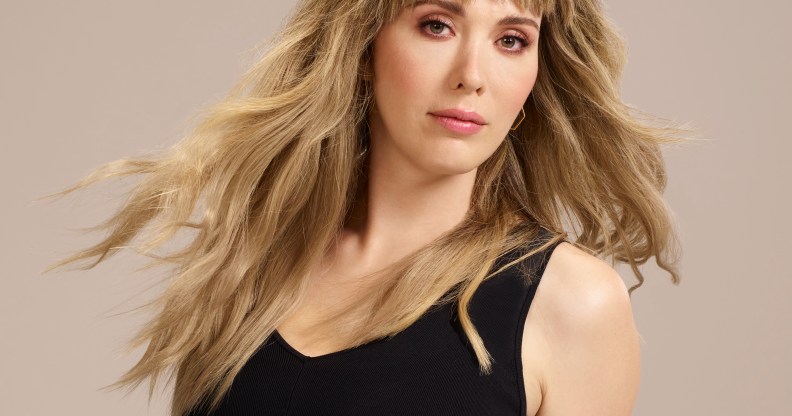Firebrand trailblazer Paris Lees on class, celebrating transgender people and the power of going blonde

Paris Lees. (Pantene)
Paris Lees first went blonde after a bad breakup.
A natural redhead, she says that the two-year journey – which began with her “sitting there crying, feeling heartbroken” – to becoming blonde was “a spiritual homecoming”.
It’s apt, then, that Paris is now Pantene’s first transgender haircare ambassador in the UK – and to be representing their Power of Hair campaign, which is all about the transformative power of hair and its connection to our identity.
“The only time I saw trans people growing up were as objects of pity, ridicule or disgust,” Paris tells PinkNews.
“Like many young LGBT+ people, and trans kids particularly, I grew up feeling like I was dirty, mentally ill, ugly, inferior, a pervert… essentially that there was something wrong with me, that I was less than other people,” she says.
“The idea that in 2019 we would be celebrating trans people and saying, ‘Yeah, I’m having a good hair day!’ would’ve blown my mind when I was 10-years-old!”
Pantene first approached Paris earlier this year to be their first trans ambassador, and she says her first thought was, why not?
“I was born into a society in which trans people were denigrated and that was it,” she says, “and now we’re living in a society that celebrates trans people. And why shouldn’t we be included?”
Now, Paris Lees is part of the Pantene Power Squad for its new campaign, along with author and philanthropist Katie Piper and boxer Ramla Ali.
As one of the most visible trans women in the UK, Paris is aware that younger trans people see her as a role model – although she says, laughing, that although she’d love to say her professional success came from having “a big masterplan”, it didn’t happen that way.
We’re living in a society that celebrates trans people. And why shouldn’t we be included?
“I’m actually very opportunistic and I’ve begged, stealed [sic] and borrowed to get where I am,” Paris says. “I’ve never really had a plan for any of it. I just knew that my life wasn’t very pleasant when I was a teenager, and I had a voice and could use language. I saw Germaine Greer and thought, well, I could do that.”
She adds: “I do have a bit more of a strategy now going into 2020, for perhaps the first time in my career.”
With career highlights including being the first trans woman to have a Vogue column, founding the first British magazine for the trans community, being the first trans woman to present on BBC Radio 1 and Channel 4, and working with All About Trans to combat transphobia in the UK media (she has also previously written for PinkNews), it’s perhaps a little overwhelming to think of what the future holds now that Paris has a plan.
Paris’ advice to aspiring writers: ‘Be middle class.’
But that’s not to say it’s been easy. When asked what her advice to young aspiring writers would be, Paris is clear: “Be middle class, for a start.”
“The fact of the matter is that I put myself through university through doing sex work,” she says. “I was able to go and do unpaid internships because I had a middle class boyfriend who had a job and supported me for several years, frankly. There are so many talented working class kids out there who aren’t able to establish themselves.”
This is something she hopes to address more in a book she’s writing with Penguin – both class, which is a “real barrier” to success, and transphobia.
I’m delighted to announce that my debut book WHAT IT FEELS LIKE FOR A GIRL will be published by @penguinukbooks in July 2020.
I think this calls for champagne! #WhatItFeelsLikeForAGirlhttps://t.co/acxU6wzRb7
— Paris Lees (@parislees) November 12, 2019
“We started All About Trans when the world was a really different place. We were battling ignorance,” Paris Lees says. “I don’t quite think that’s where we’re at now. I think we’re dealing with people who are being unpleasant about trans people not through ignorance, but because they’ve decided to be hostile. And I think thats why, for me, I’m really hoping that my book is what we need now.”
“I want to talk about these issues in a way that people aren’t expecting, and start a conversation about what it means to grow up LGBT+, working class and bullied in Britain,” she adds.
“Things have changed so much in my lifetime – today kids are being born into a world where transgender people are on the covers of magazines and appear in Pantene campaigns,” Paris says. “I grew up feeling excluded, so it’s satisfying and validating to be part of a campaign I genuinely feel good about.”

